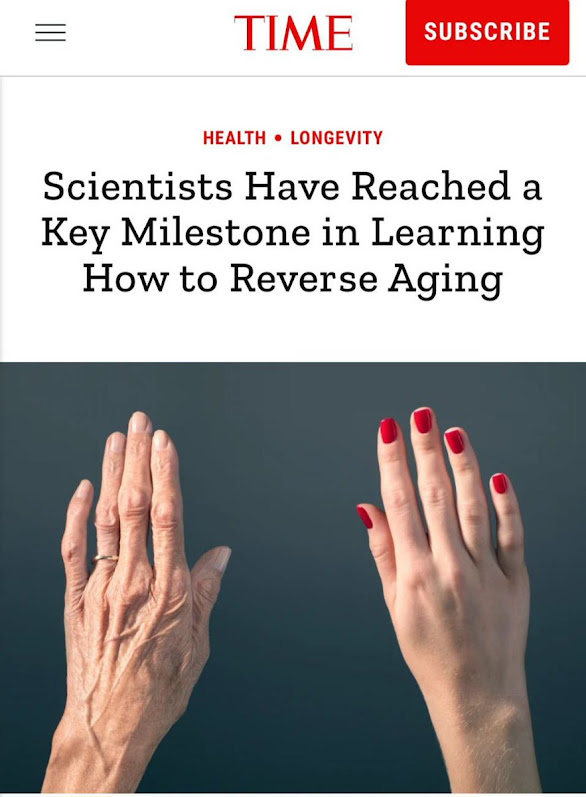In this Article:
- Vitamin D3
- Omega-3 fatty acids and Carotenoids
- Magnesium and Molecular Hydrogen
- Glycine
- NAC
- Taurine
- Curcumin (Turmeric)
- Vitamin C
- CoQ10 and PQQ
- Collagen
Can anti aging supplements reverse your age? Can you supplement your way out of aging?
Dive into 1,000+ research studies to find out the science behind.
Current AI tools like ChatGPT, Gemini from Google and Copilot from Microsoft
might return generic answers to your questions. While these can be a
starting point, they often lack the depth and updated references you might
crave for your research.
This practical guide will help you to understand aging, longevity, and all
that is involved to “turn back the clock” and to reduce your confusion from
reading only ChatGPT answers. We are providing you with science, knowledge, and best of all
possibilities.
If you are in the anti aging, longevity or biohacking space, chances are you
have heard about Dr
David Sinclair,
Bryan Johnson,
Siim Land,
Dave Pascoe and Dr
Peter Attia. Most of them do share many longevity related strategies on their social
media accounts. However, their recommendations might be too overwhelming for
an average layperson. You should also consult your doctor before starting any
new diet and supplement program to ensure safety and suitability for your
individual needs.
In September of 2019, the MIT Technology Review published “The Longevity
Issue” with a MASSIVE black heading on a snow-white cover and announced, “OLD
AGE IS OVER!” and in a font much smaller underneath are the following words:
“IF YOU WANT IT.”
Wanting it and knowing how to get it are two different things. We know how
you can get it, now you need to want it!
The global complementary and alternative medicine for anti-aging and longevity market was estimated at USD 77.3 billion in 2024. The market is expected to grow from USD 93.2 billion in 2025 to USD 537.6 billion in 2034, at a CAGR of 21.5% during the forecast period. The anti-aging and longevity industry is growing rapidly due to increasing consumer demand for natural and non-invasive methods aimed at slowing the aging process and improving overall health. (
Global Market Insights)
1. Vitamin D3: Key Studies
This is one of the most effective supplement combinations
based on evidence-based benefits, offering both anti-aging
and anti-cancer properties.
Here are key studies on Vitamin D for anti aging and longevity:
Vitamin D2025 Zhu et al - Vitamin D3 and
marine ω-3 fatty acids supplementation and leukocyte telomere length:
4-year findings from the VITamin D and OmegA-3 TriaL (VITAL) randomized
controlled trial (
The American Journal of Clinical Nutrition)
2024 Ruggiero et al - Targeting the Hallmarks of Aging with Vitamin D: Starting to Decode the Myth (
Nutrients)
2024 Zhang et al - Combined effects of vitamin D deficiency and systemic inflammation on all-cause mortality and cause-specific mortality in older adults (
BMC Geriatrs)
2023 Garcia et al - Vitamin D Supplementation and Its Impact on Mortality and Cardiovascular Outcomes: Systematic Review and Meta-Analysis of 80 Randomized Clinical Trials (
Nutrients)
2023 Cao et al - The effects of vitamin D on all-cause mortality in different diseases: an evidence-map and umbrella review of 116 randomized controlled trials (
Frontiers in Nutrition)
Vitamin D and Omega-3
2022 Ferrari et al - Combined Vitamin D, Omega-3 Fatty Acids, and a Simple Home Exercise Program May Reduce Cancer Risk Among Active Adults Aged 70 and Older: A Randomized Clinical Trial (
Frontiers in Aging).
2. Omega-3 and Carotenoids: Key Studies
Omega-3 fatty acids and Carotenoids
Omega-3 fatty acids reduce inflammation, enable the immune system to
carry out its tasks, and help the brain and eyes to function
properly.
2022 Ogluska et al - Effect of Omega-3 Fatty Acids on Telomeres—Are They the Elixir of Youth (
Nutrients)
2022 Power et al - Omega-3 fatty acid, carotenoid and vitamin E supplementation improves working memory in older adults: A randomised clinical trial (
Cognitive impAiRmEnt Study: CARES Trial 2)
2021 Harris et al - Blood n-3 fatty acid levels and total and cause-specific mortality from 17 prospective studies (
Nature Communications)
3. Magnesium and Molecular Hydrogen
Magnesium
Magnesium is a very important mineral in the human body. Magnesium
functions as a cofactor to hundreds of different enzymes, which need
magnesium to function properly.
2024 Dominguez et al - Magnesium and the Hallmarks of Aging (
Nutrients)
Molecular Hydrogen
Note: Most Molecular Hydrogen tablets uses pure elemental
magnesium as its carrier and provides you with approximately 80 mg of
magnesium per tablet. So, you receive also highly bioavailable
magnesium for a healthy brain, muscles, cells, kidneys, and heart.
4. Glycine
Glycine is an amino acid that occurs naturally in our body. When we age, glycine levels decline. Low glycine levels also have been associated with various aging-related diseases like cardiovascular disease and with type 2 diabetes.
2024 Soh et al - The effect of glycine administration on the characteristics of physiological systems in human adults: A systematic review (
GeroScience)
2023 Ceron et al - Glycine: The Smallest Anti-Inflammatory Micronutrient (
PubMed).
5. NAC
Researchers at Baylor College of Medicine also looked into supplementation with a combination of glycine and N-acetylcysteine (NAC), two glutathione precursors known as GlyNAC when taken together.
2021 Kumar et al - Glycine and N-acetylcysteine (GlyNAC) supplementation in older adults improves glutathione deficiency, oxidative stress, mitochondrial dysfunction, inflammation, insulin resistance, endothelial dysfunction, genotoxicity, muscle strength, and cognition: Results of a pilot clinical trial
6. Taurine
2024 Tzang et al - Taurine reduces the risk for metabolic syndrome: a systematic
review and meta-analysis of randomized controlled trials (
Nature)
2023 Singh et al - Taurine deficiency as a driver of aging (
Science).
7. CoQ10 and PQQ (Best for Mitochondrial Support and Heart Health)
Coenzyme Q10 (CoQ10) is an antioxidant that your body produces.
It plays an essential role in energy production and protects
against cellular damage.
2023 Alehagen et al - Effects of an Intervention with Selenium and Coenzyme Q10 on Five Selected Age-Related Biomarkers in Elderly Swedes Low in Selenium: Results That Point to an Anti-Ageing Effect-A Sub-Analysis of a Previous Prospective Double-Blind Placebo-Controlled Randomised Clinical Trial (
Cells).
2022 Alehagen et al - Improved cardiovascular health by supplementation with selenium and coenzyme Q10: applying structural equation modelling (SEM) to clinical outcomes and biomarkers to explore underlying mechanisms in a prospective randomized double-blind placebo-controlled intervention project in Sweden (
European Journal of Nutrition).
2022 Gherardi et al - CoQ10 and Resveratrol Effects to Ameliorate Aged-Related Mitochondrial Dysfunctions (
Nutrients)
2022 Tippairotte et al - Combined Supplementation of Coenzyme Q10 and Other Nutrients in Specific Medical Conditions (
Nutrients)
CoQ10 is also part of Dr.
David Sinclair’s supplement list.
The interventions testing program (ITP) tested a similar
compound, MitoQ (a better absorbable nutrient based on coQ10), and
didn’t find a life extension effect (
R).
That said, CoQ10 decline as you age and it plays an essential role
in energy production and protects against cellular damage.
Supplementing with CoQ10 might allow for more physical activity and
therefore more likely to have a protective effect than a negative
one.
Coenzyme Q10 (CoQ10) and Pyrroloquinoline Quinone (PQQ) are often combined in supplements because they support cellular energy production and mitochondrial health through complementary mechanisms. Their combination is believed to provide greater benefits than either compound alone, especially for energy, cognitive function, and cardiovascular health.
While both PQQ supplements and CoQ10 have benefits for mitochondrial function and energy production, there are some key differences between the two. PQQ is a newer supplement and has been shown to have stronger antioxidant properties than CoQ10. It also has potential benefits for cognitive function and memory. On the other hand, CoQ10 has been more extensively studied and has been shown to have benefits for heart health and exercise performance.
Related: Best CoQ10 Supplements
8. Vitamin C
Vitamin C can help to maintain a proper epigenome, especially in
combination with another longevity ingredient, alpha-
ketoglutarate.
2022 Xu et al - Vitamin C intake and multiple health outcomes: an umbrella review* of systematic reviews and meta-analyses (
PubMed)
*Umbrella review: An umbrella review, or a review of reviews,
is a systematic review that only considers other systematic
reviews as an eligible study type for inclusion. An umbrella
review compiles evidence from multiple existing reviews and is
one of the highest levels of evidence.
2024 Wang et al - Dietary intake of potassium, vitamin E, and vitamin C emerges as the most significant predictors of cardiovascular disease risk in adults (
PubMed)
9. Curcumin (Turmeric)
Curcumin — the main active compound in turmeric — has been shown to
possess powerful anti-aging properties, which are attributed to its
potent antioxidant potential.
2022 Arslan et al - The golden spice curcumin in cancer: A perspective on finalized clinical trials during the last 10 years (
PubMed)
10. Collagen
Collagen is the king of anti-aging, which is why so many youth
rejuvenation treatments focus on renewing or revitalizing collagen
production in the body — but you can kick start this process
without needles, simply by supplementing collagen into your diet.
A
2023 meta-analysis of 26 RCTs (randomized controlled trials), showed that
Hydrolyzed Collagen supplementation significantly improved skin
hydration and elasticity compared to the placebo group.
Conclusion and Take Home Messages
It's important to remember that supplements are not a replacement for
a broad comprehensive
healthy diet and lifestyle, engaging in regular exercise, and reducing stress. It's always best
to talk to your doctor before starting any new supplement program.
Certain supplements may help slow the aging process and promote a long,
healthy life. A good anti-aging supplement is one that contains substances
that are based on science and that acts on aging mechanisms. This also
enables these supplements to have an additional important benefit:
synergy.
After all, aging is a complex process caused by
various different mechanisms, such as epigenetic dysregulation,
mitochondrial dysfunction, and accumulation of proteins.
If you
have an anti-aging supplement that only focuses on a single dimension such
as “improving mitochondrial health”, you are not addressing other
important aging mechanisms, like epigenetic dysregulation or accumulation
of proteins.
Therefore, this supplement, even if it could
improve mitochondrial health, will have little impact on extending
lifespan given it only tackles one facet of the aging process.
As
such, it’s very important for a good anti-aging supplement stack or
combination to contain substances that act on different aging mechanisms
in a synergistic way.
For example, alpha-ketoglutarate (AKG)
can maintain the epigenome and improve mitochondrial health. AKG can work
together with other substances that improve mitochondrial health, like
fisetin and malate, or that improve the epigenome, like NMN and
glycine.
But addressing the aging epigenome and mitochondria is
not enough. You also need to tackle many other aging mechanisms, like
protein accumulation and DNA damage.
So the ideal anti-aging
supplement contains not just one or two substances that focus on one aging
mechanism (like mitochondrial health or the NAD+ metabolism), but contains
many substances that act on many aging pathways, and in a synergistic way. See "
Causes and Hallmarks of Aging".
Related:
I-LONGEVITY Protocol: Comprehensive Anti Aging Guide to Help People
Prevent and Reverse Aging
David Sinclair recommended supplements









Comments